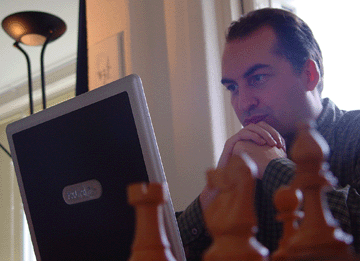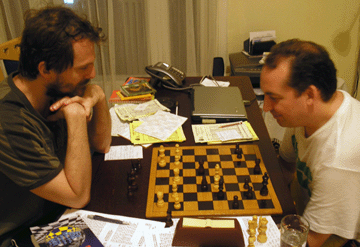Dadi Jonsson: You have been involved in computer chess for a long time and you have been writing opening books for chess computers and chess engines since 1989. What are the major changes that have occurred during that time from an author's perspective?
Jeroen Noomen: My first opening book for a commercial chess program was for Mephisto Polgar. That was when I was still a student. Shortly thereafter I became an employee at Hegener & Glaser, the producers of Mephisto programs. My next projects were the books for Mephisto MM V, the Milano, and the Vancouver. Basically you didn't have the great book tools available that we have now. A spartanic editor was the best I could get and even a text editor was used in some cases! Furthermore chess programs were still miles away from GM level, which meant that printed opening books and GM games were the only reliable sources. Nowadays computer games account for 90% of the book, which is logical considering their imposing 3000+ strength. The biggest change, I would say, is the switch from hand typed opening books to automatically generated books. Everybody can make a big book by importing a large number of games into a book file. In the old days PCs were rare, but now we cannot live without them. The software that has been developed in the past 5-10 years is a blessing for book authors; many painstaking efforts in the 1990s have been replaced by automatic tools.
DJ: Chess strength is one of the factors that differentiate the Rybka team members from its competitors. Do you feel that your understanding of chess helps you as an opening book author? Considering the strength of Rybka, how would it affect your methods of working if you were a mere beginner at chess?
JN: Absolutely. Openings have always been my favorite aspect of the game, already since my eighth birthday, when I learned the game of chess. For some reason I was never able to crack the 2200 Elo barrier, as a result of which I decided to give up playing chess in favor of studying and analyzing opening lines. When I stopped playing I had around 2190 Elo, which is far from a decent IM level, but it still comes in handy to understand what is going on in a game. In many positions computer programs still do not have a clue what is going on and in such cases human knowledge is a strong factor. From time to time you have to feed the right moves to the program and guide it through the "mine fields" to avoid disaster. If I were only a beginner, I think that I would rely solely on the computer's evaluation and the book statistics, which is rather dangerous. I always say, "Computer evaluations and statistics make people stop thinking for themselves." It is always good to have a critical opinion and not take everything that the machine suggests for granted.
DJ: Your first opening books were targeted at one special chess computer or chess engine. How has this changed over time and what are the target groups for the Aquarium opening book?
JN: That is correct. My first books were specially designed for the Mephisto programs, after that I made books for Rebel, Pro Deo and Chess Tiger. They were mainly supporting the strengths and weaknesses of the chess program in question. Besides, these books were rather small when you compare them with the opening books being made today. With my last two books I am targeting a larger audience. Of course the books are meant to give Rybka a boost in tournaments and Elo lists, but that is not the only target. Fortunately Rybka is so strong, that she can play a wide variety of opening lines without looking silly. Even gambits are played rather well, as well as dynamic positions. Therefore, my Rybka books could be much wider and deeper than my previous books. As theory is developing rapidly and computer games have become a major factor, my idea was to combine GM games and computer games and thus make this book interesting for a wide public: IMs, GMs, correspondence players, strong tournament players and people interested in opening theory or engine-engine matches.
DJ: Nowadays your opening books are based on both grandmaster games and games played by strong chess engines. Can you somehow compare the progress being made in opening theory in these two categories?
JN: In my opinion the progress made in the computer area is much faster than in GM games. This is no surprise, as each day thousands of computer games are being played, opposed to only a few top GM games. Besides, in computer games everything is tried, while GMs are more cautious in their opening choice. On the other hand I regard each top GM game as interesting for my book, while with engine games you have to be more critical. It is quite common that there are a lot of non-interesting lines being played in the computer scene and you should prevent a lot of this stuff from entering your book. I am sure no serious player is really interested in the development of 1.a3 or 1.c3.
DJ: Do you see any signs that strong grandmasters are starting to follow opening theory developments in computer chess?
| |

Jeroen working on his opening book |
JN: Difficult to answer. But maybe "yes". A year ago we saw a lot of games in the Petroff, Berlin Wall and Ruy Lopez, Marshall Gambit, aimed at getting a solid draw with black. With players like Radjabov and Carlsen playing a wider variety of opening lines (e.g. the Sicilian Dragon, or the return of the King's Indian) and the Sicilian Najdorf returning to the highest scene, I am however seeing a trend that the top GMs are taking more risks again as black. An IM friend of mine once remarked that strong ideas by weaker players are often picked up very late by the GM elite, but perhaps this will change in the future. Even 2000 Elo players have Rybka and can come up with a huge novelty. As soon as they understand this, we might see a shift.
DJ: The Aquarium book covers practically every opening that can arise. Nevertheless some openings and variations get a more thorough coverage than others. What were your criteria here?
JN: Of course I initially thought of making a kind of electronic ECO, covering virtually everything. But this was too large a project. Therefore, my main aim became to cover the lines that are popular today. I only used GM games and computer games of the past two years, concentrating my efforts on these lines. This means that you will probably find only a few examples in off-beat and less popular lines, but that is a result of the chosen path. With the Aquarium book I did a thorough update of my previous book and put most of my analysis time into the most popular lines. The idea is that if you make a book for a large audience, the most popular lines will attract the greatest attention. Of course you can discuss the fact that there are also many players that love off-beat lines and gambits. This is true, but if I had chosen to cover all lines, I would probably need another two years to complete the book.
DJ: Was your approach to creating the Aquarium book different in some way compared to your previous books?
JN: The big difference was the use of IDeA in the Aquarium book. In my opinion, IDeA is the best opening book tool at this moment, a huge credit goes to the people who invented and developed this! If I have to give a prize for the best opening book tool made in the past ten years, it surely would go to IDeA. So there are a lot of new ideas, extra lines and novelties in the book created by IDeA. Another difference is that I have been more critical about dubious lines. In this respect the Aquarium book is a bit narrower than my previous books. But it makes the Aquarium book more solid, and on the bright side I have added a lot of extra alternatives in good & popular lines. As a whole I think the Aquarium book is broader than the books I made before.
DJ: Besides novelties from recent grandmaster tournaments and chess engine games, the Aquarium book contains numerous novelties of your own. What kind of analysis do you put such moves through before you recommend them in your book?
| |

Jeroen testing his ideas against Vas |
JN: Some novelties are rather straightforward: you analyze a game with the help of Rybka and at a certain point she suggests a better move. Some extra analysis is necessary to confirm the judgment and as soon as you find out this is true you put it into the book. More complicated positions need a more thorough approach and here IDeA was a real blessing. On several Sicilian Najdorf positions I spent a lot of hours before coming to a verdict. Many new and interesting ideas were found in the process and I put them all in the book. I realize that the ultimate test of these novelties are real games, so I hope that they will be tested in computer games, in correspondence games and hopefully in GM games, too.
DJ: Have you ever considered publishing a printed opening book or adding verbal annotations to your electronic opening books?
JN: Yes. With Dagh Nielsen I had a serious plan to publish a printed book series. We wanted to do something extraordinary and were very optimistic about the idea. We even had the contents page ready for our first book! However, as Dagh chose to develop his career rather than continue his involvement in computer chess, I had to abandon the idea. It is a pity that Dagh is not around anymore, I am sure a lot of people would agree. Still, I hope he will return some time! Regarding verbal annotations in my electronic books: yes, I've gotten feedback suggesting that; many players like ideas to be explained, both with signs like "!," "!?" or "+=" and also what the author thinks of certain moves or plans. At some point I will have to add this to the book for sure. In any case the Aquarium book provides some extras like the CAP data and Rybka evaluations that make it easier to follow the lines and distinguish between good and bad lines.
DJ: Can you tell us something about your future plans regarding opening books?
JN: At this moment I have a few ideas that I am still studying. It could be a "simple" Rybka 4 book update, something special, or something really different. I am evaluating my two book releases and within the next month or two I want to make up my mind. I cannot tell you more about the exact plans at this moment, but I am sure we can return to that later.
DJ: Thank you for the interview!
